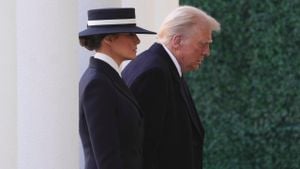On his last day in office, President Joe Biden made headlines by issuing preemptive pardons for several high-profile figures, including former White House Chief Medical Advisor Dr. Anthony Fauci and members of the House January 6 Committee. The pardons, aimed at protecting these individuals from potential political retaliation from President-elect Donald Trump, signal the deepening divides within American politics.
Biden's decision to pardon political adversaries came amid Trump's repeated threats to investigate or jail those perceived as enemies. According to Biden, “Even when individuals have done nothing wrong — and in fact have done the right thing — and will ultimate be exonerated, the mere fact of being investigated or prosecuted can irreparably damage reputations and finances.” This statement underscored Biden's motivation behind the pardons, which he described as necessary amid what he termed “baseless and politically motivated investigations.”
The list of individuals pardoned includes members of Congress, D.C. Capitol police officers who testified before the inquiry, and prominent critics of Trump such as Republican former Rep. Liz Cheney and retired General Mark Milley, the former chairman of the Joint Chiefs of Staff. Biden's move reflects his commitment to the rule of law, stating, “I believe in the rule of law, and I am optimistic the strength of our legal institutions will prevail over politics.”
Among those pardoned were five members of Biden’s own family. Biden expressed concern over the intense scrutiny and threats they faced, stating, “My family has been subjected to unrelenting attacks and threats, motivated solely by a desire to hurt me.” His acknowledgments of partisan politics reveal how both families have found themselves at the center of political firestorms.
Fauci, who has been the target of numerous attacks from Trump and his allies, voiced his gratitude for the pardon, emphasizing, “I’ve done nothing wrong, and this is no admission of any guilt.” Similarly, former Capitol Police officer Harry Dunn expressed his appreciation for Biden’s pardon, reflecting concerns for the current political climate. Dunn noted he wished the pardon were unnecessary but acknowledged the reality of threats against those who participated in the investigation.
The political ramifications of Biden's pardons extend beyond his term. After Trump took the oath of office, he swiftly criticized Biden’s actions, describing the pardons as “disgraceful” and asserting those pardoned were guilty of serious crimes. Trump’s retaliatory rhetoric serves as an immediate counter to Biden's protective measures, emboldening the partisan divide over the matter.
Legal experts have pointed out the uniqueness of Biden's pardons within American history. Steve Huefner, a law professor at Ohio State University, noted the breadth and overt intent to protect individuals from perceived political vengeance. He remarked, “The notion…that prosecutors or anybody else could question members of Congress about their constitutional functions really flies in the face of the Speech or Debate Clause,” which protects legislators from being prosecuted for official legislative acts.
The pardons directly benefited individuals who played pivotal roles during the investigation of the January 6 attack on the Capitol—an event marked by violence and political turmoil. Biden’s defense of the select committee’s work positioned it as integral to upholding democracy, with Cheney and her committee co-chair, Bennie Thompson, expressing their gratitude by stating, “We have been pardoned today not for breaking the law but for upholding it.”
Critics of Biden’s pardons, particularly among Trump’s supporters, view them as controversial. Many have deemed the actions unnecessary and reflective of Biden’s political desperation during his last hours as president. Rep. Marjorie Taylor Greene characterized the pardons as yielding to individuals guilty of substantial offenses.
Meanwhile, the political climate continues to be charged, with Trump’s inner circle reportedly maintaining lists of adversaries and enemies, demonstrating the strain between the two administrations. Biden’s historic decisions to grant such extensive clemency could persist to influence political accountability as Trump initiates his second term.
Despite the backlash, Biden's use of executive clemency highlights the shifting nature of political powers, with concerns over safety and reprisal becoming more pronounced. The pardons reflect not only Biden’s response to imminent threats but also indicate the protective undercurrents of his presidency, as public servants increasingly find themselves at odds with extremist political factions, resulting from the turbulence of contemporary political discourse.
The pardons have captured national attention and may shape the discussion about the responsible use of presidential powers, especially at pivotal political moments. While Biden's administration ends, the ramifications of his decisions may frame the narrative of accountability and justice as the nation braces for Trump's second term.



